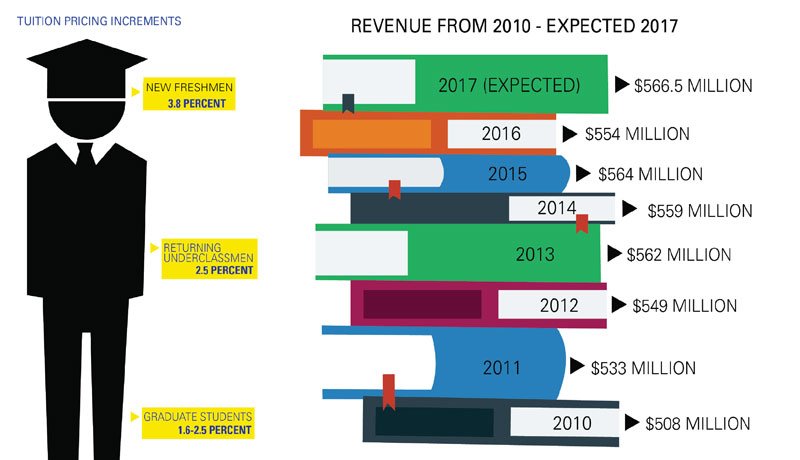A tuition increase, raises for university employees and contingency funds set aside for the still-unfunded state MAP program are among the many provisions in the $556 million 2016-2017 university budget passed last month by the board of trustees.
The budget reflects the university’s conservative budgeting philosophy, which takes into account its dependency on tuition dollars for revenue. Projected revenue is just over $566 million for an operating margin of $10 million, leaving room in case of fluctuation.
Most of the cash, $345 million, will be allocated for salaries and benefits for university employees. And in addition to a 2.5 percent raise in the compensation pool and an increase to accommodate a higher minimum wage, the university will once again increase its contribution into employees’ 403b retirement plan.
Budget documents show the university anticipating slight declines in enrollment, especially among transfer students and in the Law School.
To make up for it, tuition rates for incoming freshmen will increase by 3.8 percent, 2.5 percent for continuing undergraduates, and between 1.6 and 2.5 percent for graduate students. The starting rate for freshmen will be $37,020.
“DePaul is a highly tuition dependent institution and we strive to be sensitive and responsive to affordability concerns while continuing to invest in improving the outstanding quality of our educational offerings,” said university controller Sherri Sidler.

To offset some of the increased costs, the university has also upped financial aid by 7 percent. Overall, the rate of financial aid to tuition revenue is projected to remain stable at 45 percent.
And, as was announced in February, DePaul will honor MAP awards through next year no matter the outcome of the state budget crisis. While the budget originally set aside $7.5 million in contingency funds, the board approved increasing that total to $20 million in order to cover DePaul’s pledge.
“We are hopeful that the state will resolve the current impasse, but if not we will support our students as best we can,” Sidler said.
The budgeting process typically begins with the Strategic Resource Allocation Committee (SRAC), a body made up of nine university leaders and chaired by the Executive Vice President.
They vote to approve a proposed budget, which goes to university President Rev. Dennis Holtschneider, C.M., who, barring no objections, presents it the board of trustees.
Student Government Association (SGA) President Vanessa Cadavillo, despite the tuition increase it included, supported the budget.
Cadavillo, however, pointed to the gains made by securing increased MAP contingency funding and the elimination of the $25-per-quarter student registration fee.
“In the next fiscal year, students will no longer see the quarterly registration fee as the university is absorbing those costs without raising tuition any more than what has been trended (2.5 percent) over the past several years,” Cadavillo said.
She added that SGA will continue to fight for MAP funding with the organization going down to Springfield on Wednesday to tell legislators that #MAPmatters.
This year’s budgeting process was not without its hiccups, however. The initial vote in SRAC was 7-2 with both faculty representatives voting against. While not citing any specific objections to the budget, the members sought to take a stand on the prioritization of university resources in recent years.
Issues cited were the decline of tenure lines in recent years, growth in administrative areas and the expansion of capital projects during declining enrollment. However, after meeting with Holtschneider, the members decided to change their votes, making it unanimous.
“We, the faculty representatives on SRAC, had originally voted against the budget due to various concerns,” faculty members Michaela Winchatz and Tom Mondschean said in a statement. “Most importantly, we are troubled by the decline in the number of tenure track faculty over multiple years. However, after meeting with Fr. Holtschneider, Provost denBoer, Bob Kozoman, and Jeff Bethke — we were able to agree on a path to begin addressing our concerns and believed it appropriate to change our vote to support the 2016-2017 budget.”
According to Sidler, the faculty members expressed the desire for a more inclusive process in setting university goals.
“In response to this feedback, we are adjusting the annual budget process to incorporate year-round meetings to discuss the ongoing financial situation and key goals and concerns for the coming year,” Sidler said. “We are also reviewing ways to better integrate the budget planning and strategic planning processes.”

